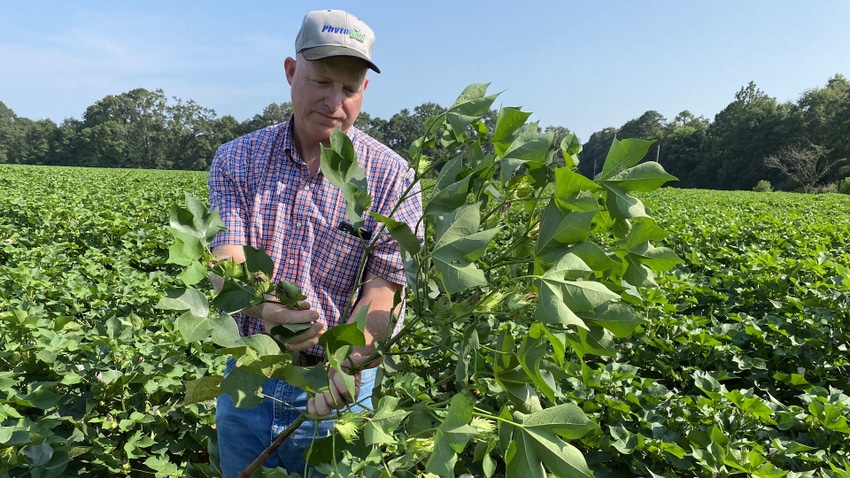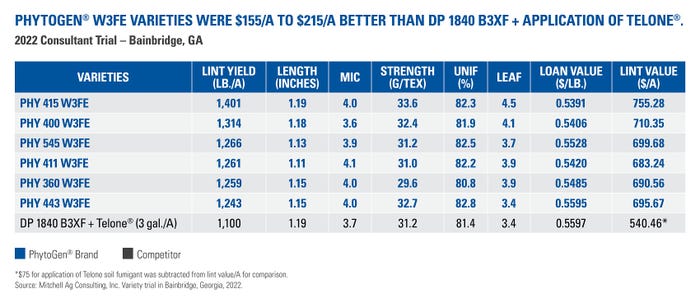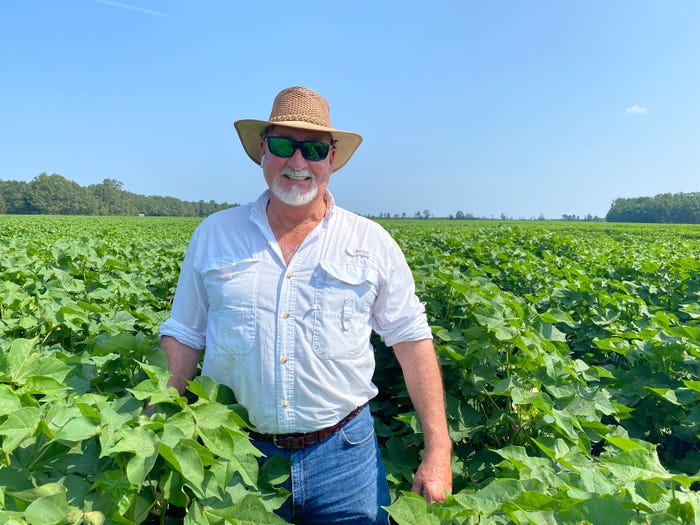March 20, 2023

When severe nematode populations ravage a cotton field, it’s hard to miss uneven stands and stunted plants.
Smaller nematode populations cause less visual damage but still lower yield potential and profits. What if you could protect yield without costly nematicide applications?
Enter a new generation of nematode-resistant cotton varieties.
Consultant trials, Extension research and on-farm experiences confirm benefits of newer varieties that offer genetic resistance to root-knot and reniform nematodes. Even better news: These varieties have high-yield potential without additional nematicide applications.
PhytoGen Cotton Development Specialist Russell Nuti, Ph.D., works with growers to conduct on-farm variety trials across Georgia, Alabama and the Florida Panhandle. In these areas alone, nematodes cost cotton producers an estimated $71 million annually.1 Nuti said newer PhytoGen® W3FE varieties have brought growers a profitable solution and changed the perception of nematode-resistant varieties.
In years past, nematode-resistant varieties were considered niche products. They offered protection against heavy nematode populations but did not have high-end yield potential. Nuti said variety trials and grower breakthrough successes have proven that stereotype is no longer true.
“With newer PhytoGen W3FE varieties, growers get built-in, season-long resistance to root-knot and reniform nematodes with excellent yield potential,” Nuti said. “New PhytoGen W3FE varieties have yield potential on par with the best nonresistant varieties, even on fields that don’t have heavy nematode populations.”
Third-party trials offer the proof
For producers with nematode problems, Nuti is often asked how genetic resistance compares with a nematicide application: Do nematode-resistant varieties require a nematicide? How do nematode-resistant PhytoGen W3FE varieties compare with nonresistant varieties with a nematicide application? He points growers to third-party consultants and Extension data for the answer.
In a 2022 consultant trial in Bainbridge, Georgia, six PhytoGen brand varieties with root-knot-nematode resistance were planted in a field with historically high root-knot nematode populations. The trial also included a competitive variety, DP 1840 B3XF, that received an application of Telone® soil fumigant at 3 gal./A.
Without the nematicide, all six PhytoGen W3FE varieties outyielded the competitive variety by 143 to 301 lb./A. The PhytoGen W3FE varieties produced $155 to $215 more lint value/A, after subtracting $75 from the competitive lint value for the nematicide application.2

Photo submitted by PhytoGen cottonseed
In a 2021-2022 University of Florida Extension reniform nematode trial, PhytoGen® brand PHY 411 W3FE and PHY 443 W3FE both yielded 30% higher than a high-yielding susceptible variety plus a nematicide application. According to the UF Extension report, PHY 411 W3FE and PHY 443 W3FE “boosted income and yield” and “have consistently provided a return on investment” in fields with severe reniform nematode pressure.3
While third-party trials reinforce what Nuti has seen in the field for several seasons, the ultimate proof is what happens on-farm with Southeast growers. Rodney Helton of Atmore, Alabama, is one of those producers who has seen an increase in yield and profits with newer PhytoGen W3FE varieties.
Helton worked with Nuti in 2020 to conduct an on-farm variety trial that included PhytoGen brand PHY 443 W3FE, a newer variety with resistance to both reniform and root-knot nematodes. After PHY 443 W3FE won the trial, Helton planted it across a majority of his acres in 2021 and 2022.

Southeast cotton producers such as Rodney Helton of Atmore, Alabama, have increased yield potential and saved nematicide costs by planting PhytoGen® W3FE varieties with resistance to reniform and root-knot nematodes. Photo submitted by PhytoGen cottonseed
The results were higher yields and a greatly improved bottom line.
“We have fields with severe reniform nematode pressure, but these PhytoGen varieties changed the game for us. The yields are higher, a good bit higher,” Helton said. “And by the first of July, my chemical bill was $200,000 less than the year before because we didn’t have to use a nematicide.”
Watch this video to learn more about Rodney Helton's experience with PhytoGen W3FE varieties. To get variety information and data for your area, visit PhytoGenCottonseed.com/facts.
1Lawrence, K., et al. 2022. Cotton Disease Loss Estimate Committee Report, 2021. 2022 Beltwide Cotton Conferences, 4-6 January 2022, San Antonio, TX.
2 Lint value calculations based off of $0.70 per pound of lint cotton.
3 Grabau, Z. 2023. How Effective are New Resistant Cotton Cultivars at Managing Reniform Nematodes? https://nwdistrict.ifas.ufl.edu/phag/2023/02/24/how-effective-are-new-resistant-cotton-cultivars-at-managing-reniform-nematodes/#:~:text=New%20dual%2Dresistant%20cultivars%20are,combination%20with%20a%20susceptible%20cultivar.
™ ® PhytoGen and the PhytoGen Logo are trademarks of Corteva Agriscience and its affiliated companies. Roundup® and Roundup Ready®aretrademarks of Bayer Group. ALWAYS READ AND FOLLOW PESTICIDE LABEL DIRECTIONS. Roundup Ready® technology contains genes that confer tolerance to glyphosate, anactive ingredient in Roundup®brand agricultural herbicides.Agricultural herbicides containing glyphosate will kill crops that are not tolerant to glyphosate. ®Telone is a trademark of The Dow Chemical Company. Telone® is a Restricted Use Pesticide. Telone is labeled under FIFRA 24(c) for nematode suppression in cotton and as an at-plant application only in the state of Georgia. In Florida, Telone is labeled under FIFRA 24(c) for nematode suppression with additional use restrictions in certain counties, including: Brevard, Charlotte, Citrus, Collier, DeSoto, Glades, Hardee, Hendry, Hernando, Highlands, Hillsborough, Indian River, Lake, Lee, Manatee, Martin, Monroe, Okeechobee, Orange, Osceola, Palm Beach, Pasco, Pinellas, Polk, Sarasota, Seminole, St. Lucie, Sumter and Volusia. The use of Telone is prohibited in Broward and Dade counties. Consult the Supplemental Labeling for the specific restrictions in your area or call 800-258-3033 for more information. Some products are not registered for sale or use in all states. Contact your state pesticide regulatory agency to determine if a product is registered for sale or use in your state. Consult the label before purchase or use for full details. Always read and follow label directions. 2023 Corteva.
You May Also Like

.png?width=300&auto=webp&quality=80&disable=upscale)



